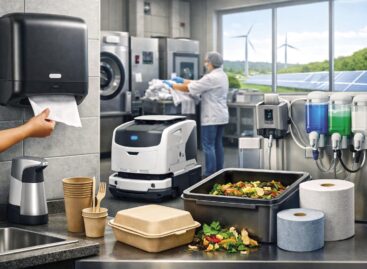Magazine: Tasks and sharing
What I saw in the Future Store at the Sirha trade show made a great impression on me. The progressive technological solutions presented there aim to serve the purpose of sustainability. For someone who studies the future it is always good to see if companies plan for the long run, taking the risk that the technology they have developed won’t live long. Still, new concepts and technologies must be developed, and new ideas must be tested all the time – says German sociologist Armin Nassehi.

Ákos Kozák PhD
futurologist – sociologist
The food industry of the future must be approached in a complex fashion. Many marketing experts said about the past decade that it was an era on which shoppers and consumers had the biggest influence, it was them who were setting the trends. I personally didn’t really believe in this. My view is that shoppers go with the flow and their attitudes towards ideas and brands are very difficult to understand. We can be sure that in the next 5-10 years the topics of environmental protection, sustainability, business ethics, manufacturing and public health will become much more important. However, consumers won’t be communicating their own preferences to market players. Instead of this they will be reflecting on the policies and ideas related to these topics.
There is going to be a dialogue between decision-makers, companies and consumers. The task of politicians and the authorities will be finding and retaining the balance between the different sub-systems. Sustainability won’t work if the representatives of various industries don’t have a business interest in it. My view is that the political sphere is rather reluctant in taking the leadership in this process, in spite of the fact that politicians can see what social media is capable of.
Manufacturers can only be successful if they join forces with retailers and the other players in the background, such as data and software providers and analysts. These parties need to shape the taste, packaging preferences and product ideas of consumers. In the future retailers will have to try themselves in the domain of production too, e.g. indoor farming by a supermarket. Consumers and shoppers aren’t passive participants of this system – but they aren’t the leaders of it either. I think that they will become more loyal in the future. Why? The idea and practice of sustainability is viewed today as just a bunch of problems, and this makes many people frustrated. States and business ventures will have to step in and present progressive solutions to this problem. In the economy of the future not everyone will be a shareholder, but all of us are already stakeholders. //
Related news
Carrefour and Coca-Cola are focusing on refillable glass bottles
🎧 Hallgasd a cikket: Lejátszás Szünet Folytatás Leállítás Nyelv: Auto…
Read more >Gastronomic innovations and traditions: 10th Catering Chef Competition at SIRHA
🎧 Hallgasd a cikket: Lejátszás Szünet Folytatás Leállítás Nyelv: Auto…
Read more >Related news
Tuned to efficiency
🎧 Hallgasd a cikket: Lejátszás Szünet Folytatás Leállítás Nyelv: Auto…
Read more >Hygiene on new foundations
🎧 Hallgasd a cikket: Lejátszás Szünet Folytatás Leállítás Nyelv: Auto…
Read more >







